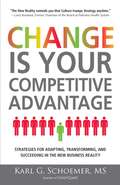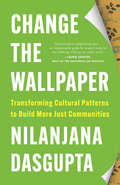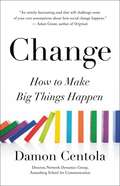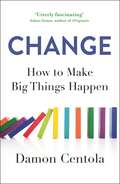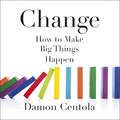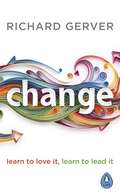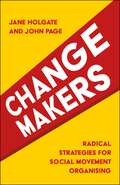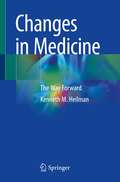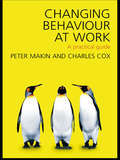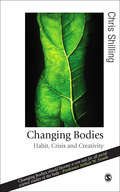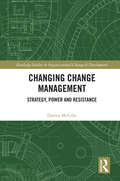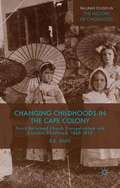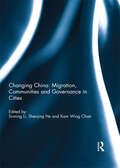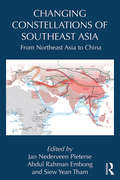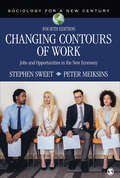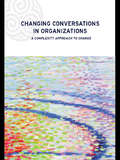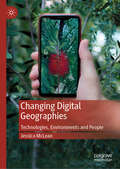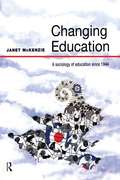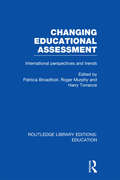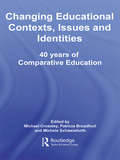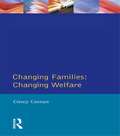- Table View
- List View
Change is Your Competitive Advantage
by Karl G SchoemerOrganizations today face a stark choice: change or fail. Transformation has become the only constant of the business landscape, and those companies that cannot adapt are doomed. But Karl Schoemer's New Reality program is here to help businesses make the tough choices that will lead to success. This book iincludes practical tools to help managers and employees:Adapt to changeIdentify Design/Defiant/Default behaviorsCreate a culture focused on the needs of the customer and consumerThis book includes case studies and anecdotes from Schoemer's clientele and positions executives and employees to make the most out of every change their company encounters.
Change is Your Competitive Advantage
by Karl G. SchoemerOrganizations today face a stark choice: change or fail. Transformation has become the only constant of the business landscape, and those companies that cannot adapt are doomed. But Karl Schoemer's New Reality program is here to help businesses make the tough choices that will lead to success. This book iincludes practical tools to help managers and employees: Adapt to change Identify Design/Defiant/Default behaviors Create a culture focused on the needs of the customer and consumer This book includes case studies and anecdotes from Schoemer's clientele and positions executives and employees to make the most out of every change their company encounters.
Change is Your Competitive Advantage: Strategies for Adapting, Transforming, and Succeeding in the New Business Reality
by Karl G SchoemerOrganizations today face a stark choice: change or fail. Transformation has become the only constant of the business landscape, and those companies that cannot adapt are doomed. But Karl Schoemer's New Reality program is here to help businesses make the tough choices that will lead to success. This book iincludes practical tools to help managers and employees:Adapt to changeIdentify Design/Defiant/Default behaviorsCreate a culture focused on the needs of the customer and consumer This book includes case studies and anecdotes from Schoemer's clientele and positions executives and employees to make the most out of every change their company encounters.
Change the Wallpaper: Transforming Cultural Patterns to Build More Just Communities
by Nilanjana DasguptaA social psychologist reveals how to nudge local cultures toward positive structural change by moving people from individual action to collective action How can ordinary people fight for social justice? Can individual actions change structural inequality? In this book, social psychologist Nilanjana Dasgupta offers a science-driven approach to achieving social change, arguing that small changes to the &“wallpaper&”—the local cultures around us—are far more effective in producing structural change locally than seeking change through bias awareness training, symbolic acts, or relying solely on good intentions. By integrating knowledge across diverse fields—including psychology, neuroscience, education, sociology, economics, public health, urban studies, cultural geography, and landscape architecture—Dasgupta shows how attitudes and beliefs take root in our mind based on what we see and hear every day. This wallpaper nudges our behavior to create or reinforce small inequalities that go unnoticed and accumulate over time. Disrupting these patterns and habits requires creating opportunities for social mixing across lines of difference, allowing new relationships to form, and promoting a better understanding of unfamiliar others&’ experiences, followed by organizing and collective action. Together, these types of experiences and actions bring real change within our reach—in workplaces, in neighborhoods, in cities and towns. Dasgupta provides fresh, actionable approaches for everyone interested in working toward justice for all.
Change: How to Make Big Things Happen
by Damon CentolaHow to create the change you want to see in the world using the paradigm-busting ideas in this "utterly fascinating" (Adam Grant) big-idea book.Most of what we know about how ideas spread comes from bestselling authors who give us a compelling picture of a world, in which "influencers" are king, "sticky" ideas "go viral," and good behavior is "nudged" forward. The problem is that the world they describe is a world where information spreads, but beliefs and behaviors stay the same. When it comes to lasting change in what we think or the way we live, the dynamics are different: beliefs and behaviors are not transmitted from person to person in the simple way that a virus is. The real story of social change is more complex. When we are exposed to a new idea, our social networks guide our responses in striking and surprising ways. Drawing on deep-yet-accessible research and fascinating examples from the spread of coronavirus to the success of the Black Lives Matter movement, the failure of Google+, and the rise of political polarization, Change presents groundbreaking and paradigm-shifting new science for understanding what drives change, and how we can change the world around us.
Change: How to Make Big Things Happen
by Damon Centola'A remarkable and important guide to effecting change in our individual lives, businesses, societies - and beyond' JONAH BERGER, bestselling author of ContagiousHow did movements like the Arab Spring and Black Lives Matter take off when they did? How did Lord Kitchener recruit 2,000,000 volunteers at the start of World War I?Why did Twitter take hold while Google+ has failed?What surprising lessons can we learn from Covid 19?From the spread of Covid-19 to the rise of political polarization, from implicit bias to genetically modified food, from NASA to Netflix - it's time to think differently about how change works.Professor Damon Centola is the world expert in the new science of networks. His ground-breaking research across areas as disparate as voting, health, technology and finance has highlighted powerful and highly effective new ways to ensure lasting change. In this book, Centola distils over a decade of deep experience into a fascinating new theory that challenges previous assumptions that new ideas are either contagious or not. Change shows that beliefs and behaviours are not transmitted from person to person in the simple way that a virus is. The real story of social change is more complex and much more interesting. When we are exposed to a new idea, our social networks guide our responses in striking and surprising ways. Drawing on deep-yet-accessible research and fascinating examples, Change presents a paradigm-shifting new science for understanding what drives change, recognising our blind spots and how we can change the world around us.
Change: How to Make Big Things Happen
by Damon CentolaHow do you change someone's mind? How do you stop bad habits? A bold new theory about the way ideas and behaviours spread (and can be altered) from the world's leading expert, Professor Damon CentolaHow did movements like the Arab Spring and Black Lives Matter take off when they did? How did Lord Kitchener recruit 2,000,000 volunteers at the start of World War I?Why did Twitter take hold while Google+ has failed?What surprising lessons can we learn from Covid 19?From the spread of Covid-19 to the rise of political polarization, from implicit bias to genetically modified food, from NASA to Netflix - it's time to think differently about how change works.Professor Damon Centola is the world expert in the new science of networks. His ground-breaking research across areas as disparate as voting, health, technology and finance has highlighted powerful and highly effective new ways to ensure lasting change. In this book, Centola distils over a decade of deep experience into a fascinating new theory that challenges previous assumptions that new ideas are either contagious or not. Change shows that beliefs and behaviours are not transmitted from person to person in the simple way that a virus is. The real story of social change is more complex and much more interesting. When we are exposed to a new idea, our social networks guide our responses in striking and surprising ways. Drawing on deep-yet-accessible research and fascinating examples, Change presents a paradigm-shifting new science for understanding what drives change, recognising our blind spots and how we can change the world around us.(P)2021 Hachette Audio
Change: Learn to Love It, Learn to Lead It
by Richard Gerver** During a time of great change, this book will give you everything you need to understand change, to adapt to change, and to inspire others to do the same ** 'To be successful, you have to be able to adapt to change' - Sir Alex FergusonThe pace of change is greater than ever. We all face new challenges every day in our jobs and in our personal lives. Those who can handle change are the most fulfilled. Those who fear change will find it hardest to thrive.As a head teacher, Richard Gerver famously transformed a failing school into one of the most acclaimed learning environments in the world - in just two years. He inspired staff and teachers to reach their full potential. As a hugely popular speaker and author, he now helps individuals and companies to embrace change.This book is his powerful personal reflection on change. Full of wisdom and practical insights, it will help you in any situation you face. Whether you are leading a company through change or looking for a new direction in life, let Richard Gerver be your guide.'Filled with memorable stories and jammed with useful, actionable approaches to befriending, dealing with and profiting from change' - Seth Godin, author of Purple Cow and The Icarus Deception'In this perceptive and heartfelt book, [Gerver] helps us see change as an opportunity for creative reinvention' - Sir Ken Robinson, author of The Element
Changemakers: Radical Strategies for Social Movement Organising
by John Page Jane HolgateCrafted for those who dare to challenge the status quo, this is a radical guide for activists. Drawing from frontline experiences in trade unions, environmentalism, animal rights, and social justice movements, the book explores essential themes from leadership to the art of negotiation. It asks crucial questions about organising and social movements in the 21st century. Avoiding easy prescriptions, the authors uniquely guide readers to where theory meets practice. Written by two experts in activist education and community organising, this is a refreshing take on movement building, empowering changemakers of today to forge new paths towards a more just world.
Changes in Medicine: The Way Forward
by Kenneth M. HeilmanThis book was written by Kenneth M. Heilman, a neurologist with a long and productive clinical and academic career, including being a researcher and teacher. Based on his experiences and achievements, as well as his frustrations and failures, he examines the challenges of healthcare, including what problems exist and how these problems may be improved. Each chapter in this book focuses on integral areas of medicine, including research, creativity, career development, patient-physician relationship, wellness, medications, social considerations such as race, and medicine's future. Changes in Medicine offers a unique view to the rapidly evolving field of neurology and practicing medicine.
Changes in Work and Family Life in Japan Under COVID-19 (SpringerBriefs in Population Studies)
by Shigeki Matsuda Hirohisa TakenoshitaThis book describes how the COVID-19 pandemic has affected the way of work, the division of household labor, and family formation in Japan. One of the characteristics of Japanese employment practices is a stable employer–employment relationship and seniority-based wage system. In return, long working hours, especially for men who are called “salarymen” (salaried workers, or “company men”), are required. The pandemic has led to an expansion of telework and has reduced their working hours, which has made them return to their homes to work. In contrast, non-regular employees, who are mostly women, has become more unstable in employment and their incomes fell. This tendency has become even stronger under the pandemic.Compared with conditions in Western countries, in Japan wives have a greater responsibility for domestic chores. In the pandemic, as children's classes shifted to online and childcare support facilities were temporarily closed, the burden of housework and child-rearing increased for wives. However, husbands who worked from home shared a part of the housework, and popular home delivery services helped to reduce the burdens on wives. Japan is one of the developed countries with low fertility rates. Under the pandemic, many Japanese postponed starting a family, which further shrank the country’s birthrate. There was a remarkably significant tendency to postpone having children among economically disadvantaged and socially isolated families. This book provides a portrait of Japan’s experience regarding the notable impacts of the pandemic on work and family life.
Changing Behaviour at Work: A Practical Guide
by Charles J. Cox Peter J. MakinProblems with costs, quality, productivity and attendance, primarily stem from bad behavioural patterns encouraged within the organization. To prevent and manage these problems, a behavioural approach to managing people is often the most effective.This dynamic textbook illustrates how behaviour analysis theory can be used to alter how people behave
Changing Bodies: Habit, Crisis and Creativity (Published in association with Theory, Culture & Society)
by Chris ShillingWhere are we at with studies of Body & Society? What are the key accomplishments in the field? This book provides the clearest and most comprehensive account of work in this area to date. Based on a novel theory of action it surveys the terrain by arguing that human identity, social relationships and moral figurations develop as a result of people living in and seeking to reach beyond the limits of their bodily being. From this starting point the author undertakes a series of studies on sport, transgenderism, migration, illness, survival and belief which illuminate the relationship between bodily change and action. The book provides an unrivalled survey of theory and empirical research and explores the hitherto neglected tradition of American 'body studies'. Wide in scope, systematic and incisive the book represents a landmark addition to the field of studies in body and society.
Changing Change Management: Strategy, Power and Resistance (Routledge Studies in Organizational Change & Development)
by Darren McCabeThe literature on Change Management works from the premise that management possesses the power to achieve change and this is evident in that resistance is little more than a footnote in most textbooks. This assumption sits uneasily, however, with the high failure rate of Change Management interventions. This book seeks to explain this paradox by providing a critical ‘relational’ approach towards Change Management. What would a book on Change Management look like that takes resistance seriously? This book attempts precisely this by exploring how resistance is as much a part of change as the strategies of those that seek to enact it. The findings are drawn from a qualitative study of organizational transformation in a Local Government Authority in the UK. Its detailed empirical insights enable readers to explore organizational change from many different perspectives considering issues such as the strategic use of metaphor and counter-metaphors; management and employee resistance; organizational politics and cynicism. It will be of interest to researchers, academics, and students interested in change management, organizational studies, human resource management, and critical management studies.
Changing Childhoods in the Cape Colony
by S. E. DuffThis is the first book to trace the history of childhood and youth in nineteenth-century South Africa. This book examines how childhoods changed during South Africa's industrialisation in the late nineteenth century. Specifically, it considers how the Dutch Reformed Church – the only organisation to evince any sustained interest in colonial childhood – attempted to mould, particularly, white childhoods. The book then traces the colonial state's increasing interest in the education and welfare of white children from the 1870s onwards, positioning this concern within a wider context of debates over poor whiteism and an emergent Afrikaner nationalism. Concluding with a discussion of the 1895 Destitute Children Relief Act, the book suggests that this legislation was the first attempt in the Cape to define precisely who a white child was, and what should constitute a white childhood. Changing Childhoods in the Cape Colony opens up the history of childhood and youth in South African historiography, and contributes new ways of understanding not only the region's industrialisation, but also histories of ideas around race, poor whiteism, and domesticity.
Changing China: Migration, Communities and Governance in Cities
by Si-ming Li, Shenjing He and Kam Wing ChanChina’s unprecedented urbanization is underpinned by not only massive rural-urban migration but also a household registration system embedded in a territorial hierarchy that produces lingering urban-rural duality. The mid-1990s onwards witnessed increasing reliance on land revenues by municipal governments, causing repeated redrawing of city boundaries to incorporate surrounding countryside. The identification of real estate as a growth anchor further fueled urban expansion. Sprawling commodity housing estates proliferate on urban-rural fringes, juxtaposed with historical villages undergoing intense densification. The traditional urban core and work-unit compounds also undergo wholesale redevelopment. Alongside large influx of migrants, major reshuffling of population has taken place inside metropolitan areas. Chinese cities today are more differentiated than ever, with new communities superimposing and superseding older ones. The rise of the urban middle class, in particular, has facilitated the formation of homeowners’ associations, and poses major challenges to hitherto state dominated local governance.The present volume tries to more deeply unravel and delineate the intertwining forms and processes outlined above from a variety of angles: circulatory, mobility and precariousness; urbanization, diversity and segregation; and community and local governance. Contributors include scholars of Chinese cities from mainland China, Hong Kong, Canada, Australia and the United States. This volume was previously published as a special issue of Eurasian Geography and Economics.
Changing Constellations of Southeast Asia: From Northeast Asia to China (Routledge Studies in Emerging Societies)
by Jan Nederveen Pieterse Siew Yean Tham Abdul Rahman EmbongSoutheast Asia is among emerging economies that have become important drivers of the world economy. ASEAN has furthered the region’s economic integration. Yet, growth remains dependent on foreign investment. Inequality has grown or remained high. Democracy, instead of consolidating, has stalled or regressed. Changing Constellations of Southeast Asia seeks to: Shed light on the gap between Northeast Asia and Southeast Asia from a variety of viewpoints, across trade and industry, services and education and language policies; Examine institutions and elite capture to understand why middle-tier Southeast Asian countries have failed in following the ‘East Asian miracle’; Examine China’s growing influence and how this growing role affects Southeast Asia as a constellation. Contributing to critical political economy and comparative development studies in East Asia, this timely volume will appeal to undergraduate and postgraduate students interested in Southeast Asia studies, International Political Economy, Development sociology and economics, Social Policy and Asian Politics.
Changing Contours of Work: Jobs and Opportunities in the New Economy (Sociology for a New Century Series)
by Stephen A. Sweet Dr. Peter F. MeiksinsChanging Contours of Work is an exploration of the American workplace in the larger context of an integrated global economy. Presented with engaging vignettes and rich data, this fourth edition shows the reader how the "old economy" is now operating within the "new economy" and how that integration shapes the development of work opportunities. Authors Stephen Sweet and Peter Meiksins use an international comparative perspective, revealing the historical transformations of work and identifying the profound effects that these changes have had on lives, jobs, and life chances. This text supports the reader's understanding of the origins of current problems confronting working people in the new economy, and contributes to a much-needed dialogue about the strategies for liberating workers from poverty, drudgery, discrimination, stress, and exploitation.
Changing Contours of Work: Jobs and Opportunities in the New Economy (Sociology for a New Century Series)
by Stephen A. Sweet Dr. Peter F. MeiksinsChanging Contours of Work is an exploration of the American workplace in the larger context of an integrated global economy. Presented with engaging vignettes and rich data, this fourth edition shows the reader how the "old economy" is now operating within the "new economy" and how that integration shapes the development of work opportunities. Authors Stephen Sweet and Peter Meiksins use an international comparative perspective, revealing the historical transformations of work and identifying the profound effects that these changes have had on lives, jobs, and life chances. This text supports the reader's understanding of the origins of current problems confronting working people in the new economy, and contributes to a much-needed dialogue about the strategies for liberating workers from poverty, drudgery, discrimination, stress, and exploitation.
Changing Conversations in Organizations: A Complexity Approach to Change (Complexity and Emergence in Organizations)
by Dr Patricia ShawDrawing on the theoretical foundations laid out in earlier volumes of this series, this book describes an approach to organizational change and development that is informed by a complexity perspective. It clarifies the experience of being in the midst of change. Unlike many books that presume clarity of foresight or hindsight, the author focuses on the essential uncertainty of participating in evolving events as they happen and considers the creative possibilities of such participation.Most methodologies for organizational change are firmly rooted in systems thinking, as are many approaches to process consultation and facilitation. This book questions the suggestion that we can choose and design new futures for our organizations in the way we often hope. Avoiding the widely favoured use of two by two matrices, idealized schemas and simplified typologies that characterize much of the management literature on change, this book encourages the reader to live in the immediate paradoxes and complexities of organizational life, where we must act with intention into the unknowable. The author uses detailed reflective narrative to evoke and elaborate on the experience of participating in the conversational processes of human organizing. It asserts that possibilities are perpetually sustained and changed by the conversational life of organizations.This book will be valuable to consultants, managers and leaders, indeed all those who are dissatisfied with idealized models of change and are searching for ways to develop an effective change practice.
Changing Digital Geographies: Technologies, Environments and People
by Jessica McLeanThis book examines the changing digital geographies of the Anthropocene. It analyses how technologies are providing new opportunities for communication and connection, while simultaneously deepening existing problems associated with isolation, global inequity and environmental harm. By offering a reading of digital technologies as ‘more-than-real’, the author argues that the productive and destructive possibilities of digital geographies are changing important aspects of human and non-human worlds. Like the more-than-human notion and how it emphasises interconnections of humans and non-humans in the world, the more-than-real inverts the diminishing that accompanies use of the terms ‘virtual’ and ‘immaterial’ as applied to digital spaces.Digital geographies are fluid, amorphous spaces made of contradictory possibilities in this Anthropocene moment. By sharing experiences of people involved in trying to improve digital geographies, this book offers stories of hope and possibility alongside stories of grief and despair. The more-than-real concept can help us understand such work – by feminists, digital rights activists, disability rights activists, environmentalists and more. Drawing on case studies from around the world, this book will appeal to academics, university students, and activists who are keen to learn from other people’s efforts to change digital geographies, and who also seek to remake digital geographies.
Changing Education: A Sociology of Education Since 1944
by Janet MckenzieFor courses in Sociology (Sociology of Education, Applied Social Studies, Research Methods, Family Studies); Education (Educational Studies, Educational Management and Teacher training - including B.Ed. and PGCE); Social Policy (Education Policy, Research Methods) and History (Contemporary History, Social History, Research Methods, Family Histories). It can also be used as a supplementary text on courses in Education Policy/Management options on Politics (Education Policy, Political Sociology, Research Methods); Psychology (Knowledge, Intelligence, Attitudes, Research Methods) and Public Administration (Education Administration, Education Management). This unusual multidisciplinary approach combines textbook and original research to provide an accessible introduction to the sociology of education, and the evolution of education in post-war Britain. The book reviews existing research findings and theories and uses family education histories to illustrate how changes in education have been personally experienced and responded to. The issues, systems, key theories and research methods are all clearly explained. In providing a fresh and stimulating source of information and new ideas Changing Education enables students and teachers to understand and challenge assumptions about what education has been, is, and should be like.
Changing Educational Assessment: International Perspectives and Trends (Routledge Library Editions: Education)
by Patricia Broadfoot Harry Torrance Roger MurphyAssessment is a key area of interest and debate in education. Its increased use by governments as a powerful means of influencing educational practice are now features of the educational scene worldwide. This volume was the first major international review of such developments and it explores the impact of assessment on all areas of education, from teaching skills to policy-making. The contributors take a global perspective to spotlight the common problems facing teachers and students, policy-makers and politicians through the world as they seek to reconcile issues of equity and national development, educational imperatives and finite state resources. The contributions discuss the changing role of assessment and public examinations, and consider such specific issues as the development of a market economy in educational provision, the difficulties of measuring standards in international studies, and accreditation of absolute rather than relative competencies.
Changing Educational Contexts, Issues and Identities: 40 Years of Comparative Education (Education Heritage)
by Michele Schweisfurth Michael Crossley Patricia BroadfootDocumenting major intellectual and paradigmatic changes in the field of comparative education in the light of the history and development of the journal Comparative Education, this book compiles a selection of articles from forty years of the journal’s distinguished history. It illustrates how changing times have been reflected in the nature and quality of published comparative research. Contributors explore the impact of key issues such as marketisation, accountability and globalisation upon policy and practice world-wide. They explore how new challenges faced by the social sciences have seen shifts in the contexts, issues and priorities attended to by comparatives and how different approaches to comparative education have influenced the intellectual and professional identities and positioning of those involved. Bridging theoretically oriented scholarship with empirically grounded research relating to issues of policy and practice and with chapters addressing questions of relevance throughout the world, this book is an invaluable resource of ideas and stimuli for further thinking and research.
Changing Families
by Crescy CannanFirst published in 1993. Routledge is an imprint of Taylor & Francis, an informa company.
